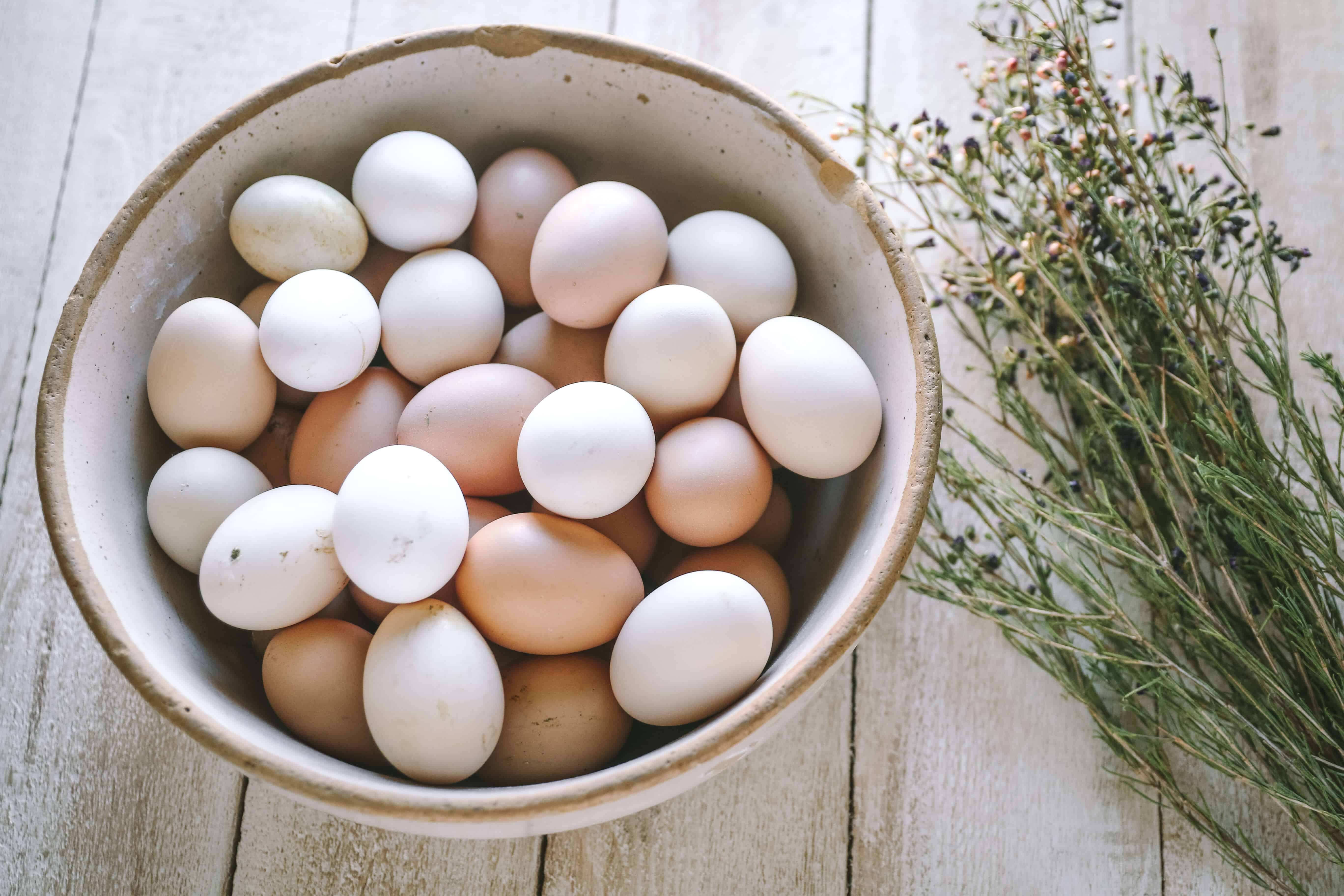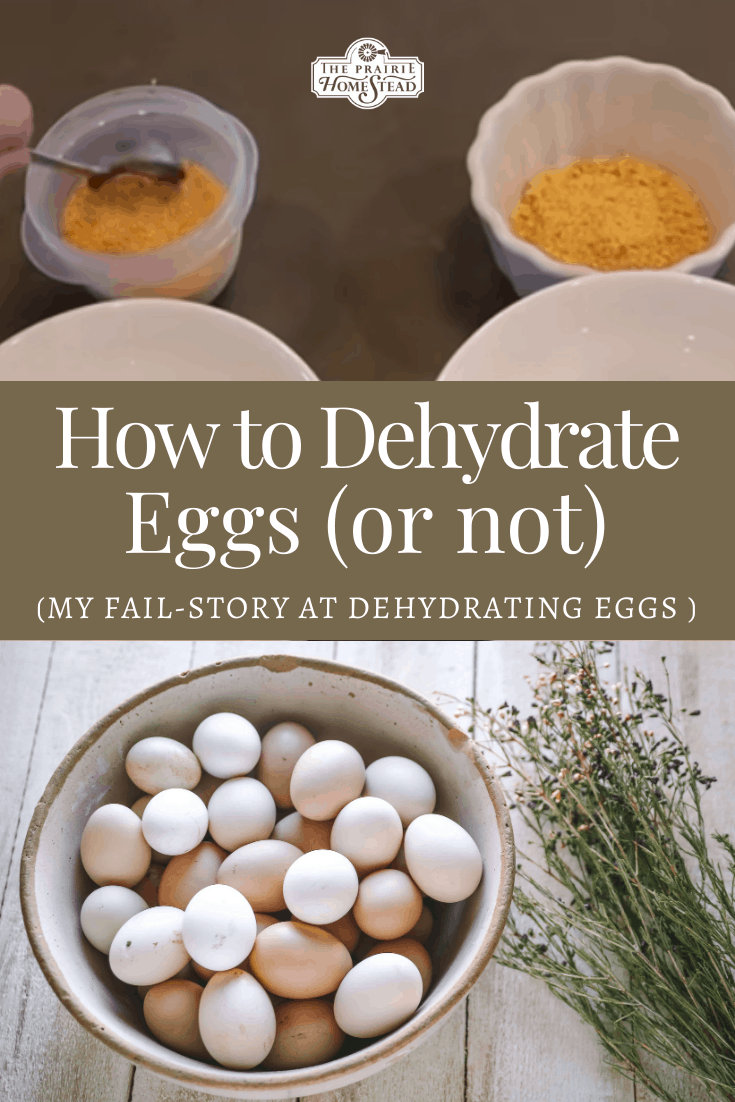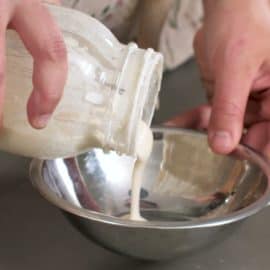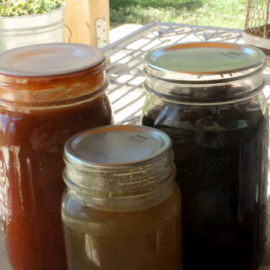
Lest you think that everything I attempt always turns out perfectly (not that you had any reason to actually think that…), allow me to share my adventure into the world of egg dehydration.
Since my post on freezing eggs got so much positive feedback, I thought I’d look into some other ways to preserve extra eggs for later. You can pickle them, cover ’em in lard or grease, and even “water glass” them by immersing them chemicals.
I’m not a fan of pickled eggs, and none of the other methods seemed too appealing to me, so I got to thinking (which is always dangerous)…
A lot of bulk food and survival food type of stores carry dehydrated eggs. So why couldn’t I dehydrate my own at home?
After a little research, I discovered that it is a fairly common practice, but I also came up with mixed reviews. Some people said it was “dangerous” to dehydrate your own eggs, while others said it was super easy and safe.
I’ve never tried commercially dehydrated eggs, and my chickens are laying well right now. So of course, I had to try it. Off to my laboratory kitchen I went.
Want to watch me compare and contrast different egg preservation methods on video? Check it out here (otherwise, just scroll down for the dehydrating eggs story):
How to Dehydrate Eggs (or not…)
First up, the cook-then-dry method.
I scrambled 4 eggs in a frying pan, just like I was cooking them up for breakfast. I put them in my dehydrator, set it at 145 degrees, and let ‘er rip.

First problem– they took forever to dry… Even longer than the raw eggs below, which really surprised me. And when they finally DID dry, the egg particles were rock hard and, to be quite honest, I had no desire to figure out how to grind them. So we’re calling that attempt a FAIL.
Next up, the “raw egg” method:
For this test, I chose 4 very fresh, homegrown eggs. (If you try this, I recommend only using eggs that come from a reputable source (i.e. That’s NOT random grocery store eggs). There seems to be some debate over whether the eggs will get hot enough to kill any bad bacteria, like salmonella. I used my homegrown eggs, which I happily eat raw, so I wasn’t worried.)
I scrambled them really well, and then poured them in a thin layer on my dehydrator tray.

(I also attempted to dry another test batch of eggs in my oven. FAIL. The lowest my oven will go is 170 degrees, and even though I tried to stir the eggs every once and a while, it was just a mess. Not recommended….)
I set my dehydrator at it’s highest setting (145 degrees) and left it for about 6-7 hours.

When they were “done” they were dry and crumbly, but definitely not powdery. Definitely more of a grainy consistency. But, I thought I’d try to cook them up anyway.
1 Tablespoon of egg powder + 2 Tablespoons of water = 1 fresh egg (or so they say…)
After mixing the dry eggs with water, it was still pretty grainy. So I let it sit for 5 minutes. Still grainy. So I cooked it up in a skillet to make scrambled eggs. Which resulted in grainy “scrambled” eggs. They tasted okay, but the consistency was hard to get past…
My next bright idea was to try grinding them down a bit more. My reasoning was that perhaps a finer powder would absorb water better, thus improving the texture.
I got out my trusty electric coffee grinder. Bad, bad, bad idea. My coffee grinder still won’t speak to me. In fact, I tried to use it to grind some flax seed the other day, and it was still sputtering and spewing egg gook. Moral of the story: do NOT use a coffee grinder to grind dry eggs. Period.
The food processor didn’t really work either. Maybe mine is just a cheap model, or perhaps there wasn’t enough quantity, but the eggs just kinda sat in the bottom of the bowl and didn’t really grind.
So out came the mortar and pestle. It sorta worked, and got the eggs ground up slightly finer, but after a second attempt to re-hydrate and scramble, the results were still mildly gross.

I did use my dry eggs in a muffin recipe, and it turned out normal and un-grainy… Perhaps powdered eggs are only supposed to be used in recipes?
So. It appears that I have three options:
- Freeze my extra eggs.
- Give my extra eggs away (or make something from this list of 50+ egg-heavy recipes…)
- Or learn to love pickled eggs.
I really wanted this to work, but it just plain didn’t. At least not for me… I might end up trying it again, but probably not for a while… It seems like a lot of work for a less-than-yummy end product.
So readers- I am dying to know– Have you ever tried dehydrating eggs? Was it successful or not? Any tips you can share?
More Egg Tips and Preservation Methods:
- Should You Wash Your Eggs?
- Do You Have to Refrigerate Eggs?
- 50+ Ways to Use Your Extra Eggs
- How to Freeze Fresh Eggs






If you would take the first eggs you dried… freeze them and then pop them in the blender they should powder 🙂
Suggestion? whole egg powder is so expensive so…you have to blend them real good first, then scrambler then pour in sheets dehydare 145 for 18 hours and then put in blender to powder them, seal air tight lasts 5-10 years
I just checked on my dehydrated eggs from 6 months ago (stored in Mason jar with oxygen absorber, in a dark closet). The powder is turning brown! Has this happened to anyone else? Any suggestions why this might have happened?
I just watched a video that said that the protein in eggs cooks at 140 degrees, so need to dehydrate them at a temperature lower than that.
It is my understanding that oxygen absorbers should not be used with oily foods such as the dehydrated eggs. Maybe that’s why it turned brown?
Would anyone think a small breed dog would eat? I’m always looking for ways to feed my pets good fresh food, and always have leftovers. Wondering if dehydrating or freeze drying would keep the leftovers best
I scramble fresh eggs in a skillet with no oil or I microwave them in the silicone Instapot lid, set on a dinner plate. I then put the eggs on 145 on mesh liners in the dehydrator. About 7 hrs they’re dry. I put them in the dry pitcher bite mix and have great powder! I store them, for extra insurance, in gallon mylar zip lock bags in the freezer. A gallon bag of egg powder is about 150 to 200 eggs, at least.
I have dehydrated eggs for a while. In my opinion looking at yours you have overcooked them in the dehydrator. You don’t want them to be brown.
I love that you tried it, failed, then told us about it anyway. 🙂 I still have to try the frozen egg thing . . .
I have recently started freezing my “eggcubes”, I have read that they are fine for baking but I’m not sure on the scrambling part. However, you can NOT get a full dozen in a standard ice cube tray unless you have very small eggs. Oh and do NOT STACK THEM while in the freezing process unless your forearms are like Popeye’s. Way to much of a workout to separate them! Lol
Go to Amazon or Ebay or where ever you shop online and buy yourself some regular size (not texas or oversized liners) silicone muffin cup liners. I just bought 54 on amazon for $15. Put them inside the cups on the muffin tin, any regular muffin pan will work . Fill them with the scrambled egg mixture each cup will hold one egg you don’t need to grease or spray the cups, the eggs won’t stick to them. They are a snap to remove from the cups once frozen. place in bags keep in freezer until ready to use. Be sure to label. Place in refrigerator to thaw. If you opt not to scramble put a small pinch of salt or sugar on each egg yolk then freeze. When you are not freezing eggs the cups are wonderful for muffins or cupcake or brownies and they can be washed and used over and over again instead of going to the landfill.
Thank you for sharing your experience it was helpful. Enjoy your honesty. I’m going to try a combination of the methods I’ve researched. If it turns out successful, I will definitely let you know.
I guess my question would be could you vaccume seal the sheet of dehydrated eggs for future powdering? Or must you powder right away.
I have never tried dehydrating eggs. Although I am going to take a look at freezing eggs 🙂 🙂
This is a different question, but have you made homemade yogurt? I just started the GAPS diet and at some point I’m going to have to learn to make it myself. The recipe itself is easy…but I’m debating about using a dehydrator or a yogurt maker.
Love and hugs from the ocean shores of California, Heather 🙂
Yes, I frequently make homemade yogurt and love it! It’s very good for you. I just incubate mine in a cooler filled with hot water. Or, you can leave it in your oven with just the light on (nothing else). Good luck!
I have been making my own yogurt for a number of years now. I tried, initially, about 25 years ago with a yogurt maker… it works – does the job… these days, I do similar to Jill… I make my yogurt & leave it, covered in towels – no water!, in a cooler for 12-24h with the lid in place. Have fun!
I make yogurt occasionally, and I do it the same as Karen does. Heat the milk to 110ish and then pour it into jars. Put lids on the jars, and then wrap the jars in towels and put them in the cooler overnight. 12-24 hours later we have soft yogurt. It can be used to make frozen yogurt treats, or any other way yogurt is used. In the past we used goat milk so it was always much softer than store bought yogurt. We’ve been buying raw cows milk lately but never have enough extra to try making yogurt with it. I imagine it would be a firmer texture than the goat milk was.
Hi Laurene,
You need to heat the milk (I use whole milk, one gallon per batch) to 180 deg. to kill off all the bacteria in the milk. Let it cool to 110 deg. then stir in 1/3 cup of sugar, if you like it sweet, and 1 cup of unflavored store bought yogurt. I use Stonyfield Farms whole milk unflavored yogurt. Put into quart jars, and put into a hot, from the tap, water in a insulated water cooler. Let sit for 4-8 hours. the longer in the water, the more sour it gets.
INSTANT POT!!! You can make yogurt in an IP in a snap! Really easy too. Google “make yogurt in IP.” There is a whole FB group dedicated to making yogurt in the IP. Good luck!?
I make yogurt in my IP often. I’ve done it many different ways over the last 45 years. I like the IP best.
No, I haven’t, but I surely did enjoy reading your post. I actually laughed out loud (with you, not at you, you know… 😉 Thanks for the information. One year I successfully stored eggs, dipped in lard and then packed in salt, in a cold cellar. They lost quality, but stayed safe. Still, though… not too neat. The old timers used “water glass” but it is expensive, so I never tried that. I will try the freezing, though. Thank you!
I know, that water glass method just isn’t appealing to me, either. Seems like too much work! 🙂
I absolutely love that you tried this! I’ve thought about it since I dehydrated chocolate pudding but that was a big fail as well. If you have chickens you can scramble the extra and feed to them instead of commercial feed – or to your dog or cat, or make something that you can freeze like ice cream base or eggnog (which we use as smoothie base or for instant breakfast on the run). Thanks for sharing with SLT!
Wow- dehydrated pudding- never thought of that before!
HERES WHAT WENT WRONG. blend whites and yolks as well as you can before you put on the dehydrator insert. I dried 45 dozen eggs, I got tired and started pushing, but about 5 big eggs most on a tray. **†the important part, egg whites turn to rubber when cooked at 150 degrees. But salmonella is not killed till 150. So you must cook your eggs at 140 degree. This works and stored the only thing is you muconsider these to be RAW EGGS. I then threw them in a blender.. impatience got some eggs whites a little close. Blender did few egg white rubbers . And boy do I have a lot of eggs I paid 1.27 for.
Mandi is right, in theory. First, foods to be powdered should be dried hard. Then if you freeze them for 15-30 minutes before you powder them, it works much better. I’ve never done this but it’s mentioned in my dehydrator cookbook that this works for making vegetable powders; it crisps the food so that it doesn’t gum up the processor. I don’t know why it wouldn’t work for eggs…
Also, if you make more than 4 at a time (like fill all your trays), you might find that your food processor does a good job of powdering them. I have a small one that would work for 4 eggs, but those big ones will need more food in them to work well. I wouldn’t give up on the idea, in other words. You have your own chickens, so “research” cost isn’t an issue for you like it is for most people who can’t, or don’t, have hens. ;D
I do think that powdered eggs would be better off being used in cake/muffin recipes; anything baked. I can’t imagine they’d be any good the way you’re trying them. They’re powdered, after all, and when you cook up scrambled eggs, they’re not powdered. So you can’t expect the results to be similar. It might work okay to make omelets with powdered eggs, though. It’s worth a try, I guess. Maybe they’d work in a breakfast casserole with some dehydrated hash browns and dehydrated cooked sausage? That way everything is already chunky so you wouldn’t notice or mind if the eggs weren’t “normal”. ? (Just thinking about backpacking meal ideas now–you wouldn’t have to use other dehydrated foods in the dish.)
I think you’re on to something here. 🙂
I’d also like how I found this when I can not eat eggs right now and I LOVE eggs! 🙁
I read on another site that you rehydrate them with a light oil like grape seed oil instead of water and let them set for 20 min instead of 5, they will come out closer to the powdered eggs you buy commercially. Not sure if its much better but anything helps right?
I have been researching dehydrating eggs as I have 11 prolific egg-laying chickens which I did not realize upon getting chickens for just two people. Oops! I thought I would get only about 6 eggs a week. Lesson learned… we women ovulate different from chickens. Obviously, all I needed were a couple. Anyway… I am writing you to tell you what a wonderfully enjoyable and funny writer you are. Your tempo, humor, and delivery flow along flawlessly as you are still greatly informative. Thanks for the giggle and information. I actually dragged my 83-year-old dad downstairs to read your blog on dehydrating eggs and we just giggled through the whole thing. Now I know to not throw a bunch of eggs into my Excalibur and expect perfect scrambled eggs a year from now when we are all “self-surviving” which is what other goofy blogs seem to convey. Count me in as a reading fan! Heather Glass from Boise, Idaho
I have dehydrated whole eggs with great success. This is how I do it: first if I have farm fresh eggs I pasteurize them; if I am using store bought eggs they should already be pasteurized. Next I preheat my dehydrator to 135 degrees F. I then break the eggs into a bowl and whip them until they look like they are going to form peaks. I then pour my eggs evenly onto clean fruit leather trays that have sides. I then dehydrate the eggs for 12 hours. after the eggs are dehydrated I crumble them as small as I can and then put them threw my coffee grinder. If they bind up the grinder that is a indication the eggs are not dry enough. if you need to put them back into the dehydrator and dry for an additional 4 hours. after I have my eggs ground to a fine powder I usually place the powder on a clean fruit leather tray and dehydrate for 2 more hours. Your finished product should not clump together when squeezed. I have made scrambled eggs with my powder and could not tell the difference in taste from scrambled eggs made from fresh eggs. The only difference in preparing scrambled eggs with egg powder is that you must let the egg mixture stand a good 5 minutes to let the eggs reconstitute or you will get a grainy texture.
Scrambled egg recipe
4 tablespoons whole egg powder
4 tablespoons water
splash of milk
salt and pepper to taste
whisk together until well combined
let stand 5 to 10 minutes
cook as you would scrambled eggs made from fresh eggs.
Thanks for sharing your tips Cathy!
Thank you I’ve been dehydrating large amounts of eggs and grinding them and they look like cornmeal..I have at this time put them in jars with dessicants …I will go back and do some tweaking on them to get the outcome as you have described…Thank you so much because I just couldn’t figured out and I dang sure don’t want all of the hard work go to waste…
Cathy I appreciate this so much!
Good Morning ! I wish I had read your comment before putting 26 eggs (whipped in my Vitamix Blender) into my dehydrator. I did not pasteurize them ! Thank You for your recipe to make scrambled eggs with the powder. I, too, re dehydrate all of my powders, just to make sure they are completely dry ! I powder anything and everything I can get my hands on ! This is my first attempt at raw eggs. I do have a question…Can you use this powder in Baking, say cakes/cookies ? That was my original intent. Thank You In Advance ! Patti
Thank you for sharing your tips! I actually have some dehydrating as I am writing this!
Reading these comments as I use my dehydrator for the first time ever. Guess dehydrating eggs in a bit of a rebel thing to do. Who knew? I have 11 hens laying about 10 eggs a day and have only so much room to store water glassed eggs. 5 hours in. Glad I found this blog and read the comments!
Hi Heather! I live in Nampa! Hope you are still enjoying your chickens. I have chickens and ducks and 3 loud geese.
I agree with you, this blog is well written, entertaining, and informative. I especially love that she writes about the failures as well as the successes, so it isn’t always “everything I do is always perfect!” Sometimes I learn more from mistakes than from successes.
God bless you all!
Hi I’ve been dehydrating eggs this week so far 7 dozen, I don’t have chickens as I live in the burbs though I grew up on a farm and the farming life never leaves your blood, so I buy eggs when they are very cheap dozens at a time, I did a lot of research before dehydrating I saw a lot of people scrambling them some adding oil ‘a no no’ some adding butter ‘no no’ I boil them – then I guarantee there is only egg and nothing else that can contaminate a batch of hours of hard work, I boil then use a hand grinding mill to break them up to smaller pieces looking like they are scrambled then I dry them in the oven on 100 fan forced stirring them frequently never leaving them for a moment as they can burn fast, the whites always takes the longest to dehydrate yolk is very fast, taking them out when they look like they cant take the over anymore, then I mill them again now they are finer and can fit on the one tier on the dehydrator, checking them each half hour prodding with my fingers making little mounds so each little bit gets its turn to be dehydrated .. Another tip when boiling the eggs splash and dont be shy some vinegar in the water it helps part the shell from the sack and does not alter the taste of the egg.. Hope this helps, Always interested in any tips or easy ways ….
Cheers, Kerryn….
P.S with the egg shells dry them out in the sun, crush them and throw them in your garden beds ‘snails hate them’ 🙂
I read on another website that it works best if you separate the yolks from the whites and dehydrate both egg elements separately.
The egg yolks should be whisked together without anything else and cooked in thinner layers……..whilst the egg white should be whisked into a foamy meringue *again, with no other ingredients* prior to dehydrating.
I take six free range eggs, crack into a smalll bowl, one at a time, and add to my mixer. I beat on high until they become kinda meringue stage……………scramble in a teflon skillet until completely done. Cool, chop up in medium pieces. Place on parment paper in your dehydrator……temperature about 145 degrees……….depending on the dehydrator you have. Dry to brittle stage…….remove , let cool and powder in a dry blender. Turned out great for me. There is a differences between a dry blender and a wet blender. Wet is for mixing liquids and a dry blender is for grinding nuts, seeds , popcorn, etc. Place your eggs in jar with an oxygen absorber and add lid and ring . Be sure to store in a cool dark area. Also be sure to label. For your info, Store bought eggs turned out great also.
Hi. I just did my first batch of eggs very similar to the way Julia did hers. I used regular blender on high. Came out a very fine powder (six eggs=about 1 cup). I will be rehydrating and trying some for breakfast. (My son and I will be going on 2-week bicycle camping trip. Thought it would be a nice alternative to instant oatmeal). I think if you had taken the 1st batch that you threw out, and blended them; they would have been fine. I read somewhere that they should be brittle. I will try putting in freezer before blending next time, as the blender needed soaking to get the last of the fine powder out.
Just tried rehydrating for breakfast–yuck–grainy. I guess they will be tried for baking. For survival, I would eat them just before insects, although insects would probably taste better. 🙁
Yes, I couldn’t get past the grain texture, either.. LOL about the insects! 🙂
Thank you for posting this. I have celiac disease and react to tiny amount of gluten contamination. I can only eat eggs from pasture raised chickens and they are only available in the warm season here. I froze a bunch last warm season to get me through the winter, but they sure take up space in the freezer. That got me thinking about dehydrating. It was sure nice to find your post and realize that I need to take my thinking in another direction. Thank you!
I add half water and half milk put my dehydrated eggs back in blender on high a few seconds or more then cook. it does help get most of the GRAINY out not all but most. hope this helps
Great tip Bridgett! Thanks for sharing! 🙂
I think you can grind them to powder successfully in a grain-type grinder.
VitaMix has a grain container + special blade https://secure.vitamix.com/32-Ounce-Dry-Grains-Container.aspx
I have this and I grind all kinds of dehydrated veggies etc. in it. Works for stuff like grinding pepper, cinnamon sticks. I once dehydrated 2 large banana squashes and then ground them to powder.
I’d definitely like to try this with a high-powered blender like the Vitamix and see how it works!
I’m defiantly going to have try this, if it at least works in baking then its a go for me. I want to make up some baking mixes and I don’t always have eggs or money. So what I’d like to do is have everything a full mix, just add water. Premixes save time and are a good gift. I’ve seen someone do up one that was a cookie mix in a jar layering each ingredient like sand in a jar, then tag and labeling. It was very pretty and that receiver could make it up when ever they wanted to and not get inundated with cookies on the holidays lol
Let me know how it works for you! I think that a high-powered blender might be the key. 🙂
My dad gave me a bunch of dehydrated eggs this spring and I originally had the same problem… til I read the directions :p (go figure)…
(1Tb egg + 2 Tb Milk) To get your eggs to be ok (not grainy), let them “rehydrate” in MILK sitting on the counter for 5-10 minutes… THEN cook!
If you dont have enough patience, dry eggs are only good for baking.
Ahhh… milk! I never thought of that! 🙂
But remember to let it sit on the counter 10min! Not even milk will work if you dont let it rehydrate BEFORE you try to cook it.
I am in the process of drying egg whites. I whipped them in the Kithenaid until they were stiff peaks and then swiped them in about 3/4 inch thickness on Silpat sheets, stuck them in the dehydrator at 165 degrees. I am needing meringue powder for a glaze recipe I want to try. I am hoping that it will powder easier if it is whipped first. Thanks for sharing your experience.
Good idea– hadn’t thought of that– hope it works for you! 🙂
They turned our perfect! Nice and powdery, dried in a few hours.
Awesome!!
Great article and comments. Very helpful. After reading the OP and all of the comments I am ready to try this myself.
Great stuff, Jill! You should do a YouTube vid about Prepping! 🙂
I had some dried eggs bought online. I decided to seal them in pint jars. So, yesterday, I had no eggs(we get them from a friend) and went for the unflavored gelatin, my egg substitute, and then remembered the powdered eggs. (nice with a food saver, you can just reseal, huh?)
I added the water to the powder and let it sit for about 10 minutes while attending to cooking.
I used the egg in cornbread–my husband ate the whole thing by himself except for two small pieces.
It was great; you’d never guess it was made with powdered egg.
A success and I am gonna dry my own also..the project for this week when we get farm eggs.
Cool! Hope your egg drying attempt is a success!
Thank you for sharing. Thanks also to everyone who shared their comments. I’ve been wanting to do this for a long time, but repeatedly “chickened out” so to speak. I am on my way now with dehydrated eggs being my next project with the dehydrator. I love finding new things I can dehydrate to store more compactly. Wonderful!
I scrambled my eggs then ran them through the food processor. I then dehydrated the eggs and when done put them through the food processor again. Running through the first time made the egg not clump up when dehydrated. Seems to have worked out good so far.
Since you have chickens and are using FRESH why not oil the extra ones to get them to last for several months?
http://www.offthegridnews.com/2012/03/05/preserving-eggs-for-the-long-term/
I have just done my first batch after seeing it on youtube. I watched OurHalfAcreHomestead and she uses a coffee grinder. Mine turned out fine and crumbly except for a few hard lumps,
Hmmm… Maybe i need a different coffee grinder.
I found this website explaining how to dehydrate eggs. They tried your version and another approach I think:
http://www.tacticalintelligence.net/blog/how-to-make-powdered-eggs.htm
I dehydrate raw. Then blend. Soak 1 tb to 2 tb water. Blend before cooking. Makes ok scrambled eggs.
I have a dozen hens who give me a dozen eggs nearly every day! I give many eggs away to family and friends, but got to wondering how I might store some of the extra I have hanging around; it’s not like I’m not going to get more tomorrow (at this point in my hens’ lives). So, I thought to myself “Hey, maybe I can make my own powdered eggs. Brilliant idea! I was so excited that I had this thought….I was certain it came from God because I wouldn’t have thought of it on my own. So I set out to discover the best way to dehydrate my own fresh eggs! I decided to go with the wet-dry method. I beat 6 eggs together per fruit roll tray, dried them at 145 degrees for about 16 hours. They look disgusting, and smell worse than that! (First time I dried them in the house; now they’ve been delegated to the garage.) After drying them, I ground them in the dry container of my Vitamix…makes a nice powder, then put the powder into a food saver bag and sucked all the air out. After a couple of months of dehydrating and storing my beautiful, treasured eggs I decided I might want to cook some up to see how they are. I just did that 15 minutes ago…..and they were NOT at all like I expected them to be. I used 1Tbsp of powder to 2 Tbsp water, but didn’t let them soak for 10 minutes (I will do that next time, along with the milk idea). I couldn’t get past the grainy texture….and the color threw me off a bit as well, but I suppose I would eat them if I were starving…….just before I had to eat insects. I think I will try freezing some. Thanks for the post and stay in His grip!
Bless you, my child. If you’d ever bought commercially dehydrated eggs, you would know that even those are only to be used in baking–they taste **horrible** and have terrible texture if you attempt to make scrambled eggs, omelets, or any other dish with still-recognizable egg in it. If you don’t believe me, ask anyone who ever made the mistake of taking powdered eggs on a camping trip, LOL.
The ready-to-rehydrate-and-eat precooked scrambled eggs sold for food storage and backpacking by Mountain House and others are freeze-dried, not dehydrated, after cooking. They are edible, but I think only so-so in flavor (which is probably why they’re always sold gussied up with some added freeze-dried bacon, bell peppers, onions, tomatoes, and/or cheese). Freeze-drying, unlike dehydration, maintains the original size and internal structure of what is dried. Rehydrated freeze-dried will taste and look just like the same item frozen and then thawed. However, there are also issues with freezing eggs and then using them for cooking–yolks usually have to be stabilized with massive infusions of either sugar or salt before freezing to maintain their cooking characteristics.
The only successful, delicious storage egg product in the world that I have ever found is Ova Easy egg crystals–which are pasteurized and freeze-dried, presumably using some variation on the technique described in the article linked below, although they do also say they remove the glucose for better shelf stability, so probably that freezing technique plus some additional manipulation before crystallizing and then flash freezing and freeze drying.
Unless/until you can buy a home freeze dryer, stick to pickling your eggs or keeping them at 50 degrees or lower with one of the standard shell-sealing preservation techniques (oil, waterglass, etc.)
Here is that article on freeze-drying eggs, which will give you some idea of the issues involved in successfully drying eggs for storage.
“Preserving functional properties of hen’s egg yolk during freeze-drying”
http://fs.unb.br/nutricao/laboratorios/tecdie/wp-content/uploads/2012/10/Preserving-functional-properties-of-hens-egg-yolk-during-freezedrying.pdf
Not necessarily so. I am here because I’m looking for a copycat recipe to the Mountain House Breakfast Skillet which is deyhdrated scrambled egg with sausage and potato. I would rather make my own to save the expense and to be able to add more veggies. But maybe the way they make it there is different in a commercial processor because I’m not finding recipes where you leave the deyhdrated egg in chunks and don’t grind before reconstituting like it is in their recipe. FYI the reconstituting instructions for that backpacking meal are to add hot water to the pouch, stir, and wait 10 minutes. After that you can optionally fry but they are ready to eat as is. You could try those instructions with yours and see if that makes a difference. Wondering if you had reconstituted the first batch that way if it would have tasted a lot better and not as grainy.
I have personally done the uncooked powdered eggs thing, I, however,did a 4 dozen batch. The trick is, leaving the eggs in the dehydrator long enough the COMPLETELY dry them…”6 or 7 hours” is not even close to being enough time for complete dehydration. After about 16 hours of drying time I removed the dried product, broke it into manageable pieces and completely powdered them in my blender,( not a food processor and not a coffee grinder). No muss, no fuss and no “eggy gook”…Just fine powder.
Reconstituting these eggs takes about 20 minutes for the powder to fully absorb the added water, Use room temp or slightly warm water, and allow the egg powder and water mixture to “slake”,( those of you who have done masonry work will appreciate that term LOL). The resulting egg mixture comes out pretty darn close to the fresh egg thingy. I have used these in baking, scrambled eggs and omelettes…nobody has ever known the difference.
Ed, how did you prepare the eggs before dehydrating? Stir a bit, beat them like crazy, or whip to death?
I did this one time to take on an 8-day backpacking trip years ago. Let’s just say I didn’t exactly get excited on the mornings that I had to rehydrate my lumpy hard eggs. I put them in my Jet Boil while I brought the water to a boil and let them steep. Then I had “nutritious” egg water, and somewhat soft-ish egg lumps. Yeah…it wasn’t the best. But I also didn’t starve or get sick, so it could have been a lot worse. I certainly wouldn’t be doing that again though. Maybe if I could get them to powder in my blender I’d take them along to mix in with oats for a protein and fat boost.
Actually eggs are very easy to dehydrate. You beat or blend them pour on fruit leather trays set heat around 145 an wait 8-10 hr.s then you grind in spice grinder to a powder and your done. I than put the powder in a zip mylar bag with oxygen absorber an your good for 5-10 yr.s they are very good rehydrated if you have used good organic eggs.
I’ve found that eggs dehydrated at about 140 for 9-10 hours are the easiest to deal with. There shouldn’t be any sticky spots. If you’ve got sticky spots of egg, put them back into the dehydrator. Scrape off the dehydrated eggs into a freezer bag and pop into the freezer for about 30 mins then put them into a blender or food processor. This helps them to break into a powder easier and not stick to the sides or blades of the processor/blender. Once it’s a powder, you can put them into a freezer safe container and freeze them. When they are really powdered, it should help them not have the grainy texture that you were getting.
Thanks for sharing your tips! This is great.
I used powdered egg yolks in a brownie mix & they came out fudgy, just the way we like them
Nope, nope, nope. After my own disastrous results trying to dry eggs, I now crack em, whisk em and put them in my vacuum sealer then freeze them in 2 egg packets. Or, when I was cooking for the high school band – 24 egg packets. They thaw and cook beautifully. I have been thinking about salt cured egg yolks and will try that next. Thanks for the article and your transparency!
Have you tried water glassing eggs? They keep for about a year and they are just like eating fresh eggs. There’s a few other ways to preserve eggs for backpacking or survival or just because. Lol.
I just dehydrated some raw eggs and rehydrated them for breakfast to rest them out and to my surprise they were great! I couldn’t tell the difference.
1. I recommend using warm water to reconstitute them.
2. If you have an emulsifying blender or a coffee whisk it is great to fluff them up and get them really blended when you reconstitute them.
3. Plus I waited about 10 mins once adding the water!
4. Lastly, it was a bit of extra time but well worth it, sift the dehydrated eggs after pulsing them in the blender to make sure they were a super fine powder. 😉
Best of luck to you all! Happy dehydrating!
That’s awesome!
i only wanted to say that Europe does not refrigerate their eggs, reason, their eggs are not washed before they sell them and the ones we sell in USA are washed and cleaned before selling so they do need to be refrigerated.
First things i though of when i read you needed to grind up your eggs into powder is a spice grinder, nothing else that i can think of will work the way you are expecting them to .
I use my spice grinders ( i have three) for so many things and they come with different settings, the more settings the more expensive. I love the one that you can set automatically grind to what you set and how long is all automatically done, no guessing and they have never failed me.
Hope it helps.
I dehydrate eggs all the time. 160-165 degrees. I just put cover a cookie pan with foil, scrambled up 4 or so eggs at a time, make a thin layer of eggs & dehydrate in my oven for 6-10 hrs, stirring them halfway through. Then they cool & go through a coffee grinder & straight into a sealed jar. Dehydrated eggs are terrible for scrambling but still work well in baking, even just adding the powder without mixing with water. We also freeze eggs in muffin tins for frying/scrambling. They taste the same even though they look different.